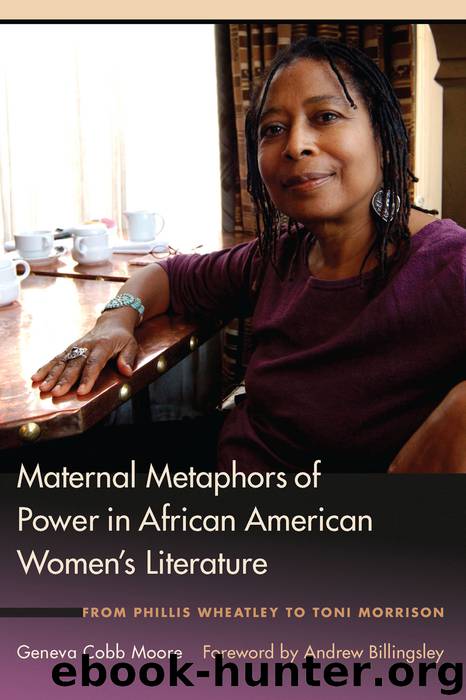Maternal Metaphors of Power in African American Women's Literature by Geneva Cobb Moore

Author:Geneva Cobb Moore [Moore, Geneva Cobb]
Language: eng
Format: epub
ISBN: 9781611177480
Publisher: University of South Carolina Press
Published: 2017-01-15T07:00:00+00:00
5
The Phallic Maternal
Alice Walker’s Novels of Archetypal Symbolism
Mr.___ ast me the other day what it is I love so much bout Shug. He say he love her style. He say to tell the truth, Shug act more manly than most men. Speak her mind. Shug will fight, he say. Just like Sofia. Mr.___ think all this is stuff men do.
Since the anima is an archetype that is found in men, it is reasonable to suppose that an equi- valent archetype must be present in women; for just as the man is compensated by a feminine element, so woman is compensated by a masculine one.1
In How Free Is Free? The Long Death of Jim Crow, the historian Leon F. Litwack remarks on the hope and aspiration of the leader of the civil rights movement, Dr. Martin Luther King Jr. (1929–68). For Litwack, as for others, including Alice Walker, King was the “Face of the Movement,” inspiring the masses while understanding the challenges of American history facing them. Litwack writes the following summation: “King had always scoffed at the notion that civil rights legislation alone had created a level playing field. He asked Americans to think of it as a track meet. If a man is entered at the starting line in a race three hundred years after another man … he would have to perform some impossible feat to catch up.” The March on Washington, August 28, 1963, was one such feat, drawing the nation’s attention to civil rights and attracting hundreds of thousands of Americans and applauding King’s now-famous speech “I Have a Dream.” A year later he received the Nobel Peace Prize in Norway. The Civil Rights Act of 1964, initially filibustered by southern senators, was another major feat, a bill, signed into law by President Lyndon Johnson, that banned discrimination against blacks in employment and in public accommodations. However, “by the end of the 1960s, the hope that had once sustained King and the movement” was gone.2 After leading a campaign for the rights of striking garbage workers in Memphis, Tennessee, on April 4, 1968, the peaceful dreamer was murdered. In Meridian, Alice Walker, the civil rights activist/author, provides a literary obituary of the 1960s, a period of change and upheaval.
Unlike Paule Marshall, Walker does not give an obligatory nod to the movement: she describes the major aspects of it in her first two novels but afterward points her readers in another direction. Thus a major motif of individual regeneration marks the distance that Walker has traveled in her career. From a civil rights activist/author committed to changing society in The Third Life of Grange Copeland and Meridian, Walker becomes a transnational womanist/activist devoted to the psychological process of self-healing across fault lines in The Color Purple, The Temple of My Familiar, and Possessing the Secret of Joy. Because the social order is slow to change and progress, because beloved leaders are assassinated and masses left leaderless, Walker emphasizes the importance of the inward journey to effect positive, lasting change.
Download
This site does not store any files on its server. We only index and link to content provided by other sites. Please contact the content providers to delete copyright contents if any and email us, we'll remove relevant links or contents immediately.
| General | Discrimination & Racism |
Nudge - Improving Decisions about Health, Wealth, and Happiness by Thaler Sunstein(7689)
The Fire Next Time by James Baldwin(5421)
iGen by Jean M. Twenge(5403)
Adulting by Kelly Williams Brown(4561)
The Sports Rules Book by Human Kinetics(4377)
The Hacking of the American Mind by Robert H. Lustig(4363)
The Ethical Slut by Janet W. Hardy(4236)
Captivate by Vanessa Van Edwards(3835)
Mummy Knew by Lisa James(3680)
In a Sunburned Country by Bill Bryson(3528)
The Worm at the Core by Sheldon Solomon(3480)
Ants Among Elephants by Sujatha Gidla(3458)
The 48 laws of power by Robert Greene & Joost Elffers(3219)
Suicide: A Study in Sociology by Emile Durkheim(3009)
The Slow Fix: Solve Problems, Work Smarter, and Live Better In a World Addicted to Speed by Carl Honore(3001)
The Tipping Point by Malcolm Gladwell(2903)
Humans of New York by Brandon Stanton(2864)
Handbook of Forensic Sociology and Psychology by Stephen J. Morewitz & Mark L. Goldstein(2691)
The Happy Hooker by Xaviera Hollander(2682)
